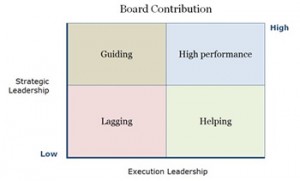
The State of Governance in the non-profit sector: Governance- Strategies to improve Board Performance. Arcus interviewed 65 board directors of non-profit organizations to identify the key barriers to strengthening board performance. Most directors are interested in spending more time on strategic planning and in steering the direction of the organization. These areas will require a greater level of involvement and time commitment of board members. However, there is agreement that optimizing the time spent by board members towards more high impact areas is a key to better performance, for example, a greater focus on longer term imperatives that could support the success of the organization is an area of interest.
Our survey indicates that while directors spend just 18 percent of their time on long term strategic planning for the organization, 85 percent of directors would like to spend at least half their time on strategic planning. In addition, directors see a significant opportunity in changing the composition of their boards by adding new directors with diverse skill sets that would strengthen the boards collective capabilities in supporting the strategic planning process.
Another area of opportunity is the growing expectation of increased accountability of boards, a fallout of challenges faced by boards in the corporate sector. A majority of directors acknowledge that board knowledge needs to be a priority due to significant gaps in the understanding of the boards fiduciary responsibilities. Directors believe that a better understanding of board responsibilities and organizational strategic challenges will lead to high quality debates and a more active exploration of assumptions of management proposals for the organization.
Below are some highlights from the Arcus State of Governance Report:
- Sixty five percent of board members are concerned that their board doesn’t spend adequate time discussing proposals from management.
- Eighty five percent of directors say that increasing the time spent on strategic planning would strengthen the performance of their board and also of individual members.
- Over a quarter of boards acknowledge that annual board performance reviews are not conducted. Surprisingly, almost half of boards say that individual board member evaluations are not conducted every year.
- Just ten percent of directors say that their boards have a good understanding of their organizations strategy plan.
- On average, members of boards spend twelve days a year on board activities. The consensus seems to be that while the time spent (about 2 days a month) is adequate, a larger share of the time needs to be allocated to high impact areas such as strategic planning.
Please contact us if you are interested in retaining our services.
“Needless to say, there are many firms that provide research and strategy consulting services, but few can deliver the value demonstrated in performing the scope of analysis, strategies, product evaluations and practical recommendations. Your commitment and ease of doing business with your firm ensured that we had a sound basis to address our most challenging business decisions.”
– Mr. Peter Flattery, CEO, Healthcare Insurance Reciprocal of Canada
Strategic Planning Processes
Concepts and strategy: Our approach is to first use our collective experience to come up with 15-20 provocative concepts for a strategy. These are based on a series of questions that probe various topics and drivers of change. The outcome of the process is used to build several strategic maps to define and strengthen each hypothesis for a strategy.
The key to our consulting services is our ability to integrate our know-how in functional areas with our deep industry knowledge in Strategy Planning Models – “Organic” (or Self-Organizing) Planning. Click on the strategy models below to learn more.
- Model One – “Basic” Strategic Planning
- Model Two – Issue-Based (or Goal-Based) Planning
- Model Three – Alignment Model
- Model Four – Scenario Planning
- Model Five – “Organic” (or Self-Organizing) Planning
Corporate and Business Unit Strategy: We apply proven methodologies and best practices that are based on a scan of how successful companies worldwide have approached similar problems and opportunities. The process minimizes risk and ensures strategic options are arrived with a fact based methodology.
Competitive Dimension: Integrating diverse products, services, consumers, vendors, partners, R&D and product support services can be daunting.But a great strategy is an aggregation of numerous compartmentalized strategies that are scalable and ladder up to a broader corporate and business strategy. The corporate mission is a critical influencer of all strategies across levels and functional areas.

